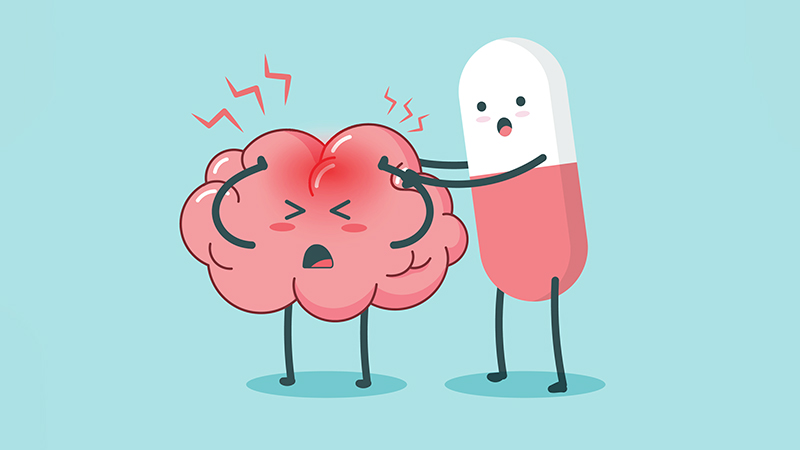Metformin is a commonly prescribed medication for individuals with type 2 diabetes, known for its effectiveness in managing blood sugar levels.
However, like many medications, it can come with side effects, and one of the less common yet bothersome ones is headaches.
While metformin-induced headaches may not be life-threatening, they can significantly affect your daily life and overall well-being.
In this blog post, we will explore effective strategies to alleviate and prevent metformin-related headaches.
From hydration and dietary adjustments to medication management and lifestyle changes, we’ll provide practical tips to help you find relief.
Whether you’re newly prescribed metformin or have been taking it for a while, understanding ‘How to get rid of Metformin headache?’ can make your treatment journey smoother and more comfortable.
Remember that your healthcare provider is your best source of guidance in tailoring a plan that suits your specific needs. Stay focused.
What Is Metformin?

Metformin is a widely prescribed medication primarily used to manage type 2 diabetes. It belongs to the class of drugs known as biguanides and helps lower blood sugar levels by increasing insulin sensitivity in the body’s cells.
It also reduces glucose production in the liver and slows down sugar absorption in the intestines. Metformin does not cause hypoglycemia (low blood sugar) on its own and is often a first-line treatment for type 2 diabetes.
It may also be used in combination with other diabetes medications or lifestyle changes like diet and exercise.
Additionally, research suggests that metformin may have potential benefits for conditions beyond diabetes, such as polycystic ovary syndrome (PCOS) and obesity.
Why Does Metformin Cause Headache?

Headaches can be a side effect of metformin, although they are relatively uncommon.
The exact mechanisms behind why metformin may cause headaches are not fully understood, but there are a few potential reasons:
Gastrointestinal Upset
Metformin is known to sometimes cause gastrointestinal side effects, such as nausea, diarrhea, or stomach upset. These discomforts can lead to dehydration and electrolyte imbalances, which in turn can trigger headaches.
Blood Sugar Changes
Metformin’s primary action is to lower blood sugar levels.
If it causes a rapid drop in blood sugar, it might result in a headache, as low blood sugar (hypoglycemia) can lead to various symptoms, including headaches.
Individual Sensitivity
Some individuals may be more sensitive to metformin or its specific formulation, which could result in headaches as an adverse reaction.
It’s important to note that not everyone taking metformin will experience headaches, and these side effects can vary in severity.
If you are experiencing persistent or severe headaches while taking metformin, it’s advisable to consult your healthcare provider.
How to Get Rid of Metformin Headache?

If you are experiencing a headache as a side effect of metformin, there are several steps you can take to alleviate or reduce the discomfort:
Stay Hydrated
Dehydration can contribute to headaches. Ensure you are drinking enough water throughout the day, especially if you’re experiencing gastrointestinal side effects like diarrhea, which can lead to fluid loss.
Take with Food
Some people find that taking metformin with food can help reduce gastrointestinal side effects, which may indirectly lessen the likelihood of a headache.
Gradual Dose Adjustment
Your healthcare provider may consider adjusting your metformin dosage or changing the timing of your doses to minimize side effects, including headaches.
Pain Relief Medications
Over-the-counter pain relievers like acetaminophen (Tylenol) or ibuprofen (Advil) may help relieve the headache.
However, consult your healthcare provider or pharmacist before using any new medications to ensure they are safe and won’t interact with metformin or any other medications you are taking.
Consult Your Healthcare Provider
If headaches persist or become severe, it’s essential to discuss the issue with your healthcare provider.
They can evaluate whether the headaches are related to metformin or another underlying cause and adjust your treatment plan accordingly.
Consider Alternative Medications
If the headaches continue to be a problem, your healthcare provider may explore alternative medications or treatment options for managing your diabetes or underlying condition.
Always follow your healthcare provider’s guidance when adjusting your medication regimen, and do not stop taking metformin or change your dose without their approval.
Tips to Manage Metformin Headaches

Managing metformin headaches involves a combination of strategies to reduce their occurrence and alleviate discomfort when they do occur. Here are some tips to help you manage metformin-induced headaches:
Stay Hydrated
Drink plenty of water throughout the day to prevent dehydration, which can contribute to headaches. Aim for at least 8-10 glasses of water daily.
Take with Food
Consuming metformin with a meal or a snack can help minimize gastrointestinal side effects, potentially reducing the risk of headaches.
Gradual Dosage Adjustment
If you’re experiencing persistent headaches, consult your healthcare provider about adjusting your metformin dosage.
They may recommend starting with a lower dose and gradually increasing it to minimize side effects.
Monitor Blood Sugar
Keep track of your blood sugar levels as recommended by your healthcare provider. Maintaining stable blood sugar levels can help prevent the headaches associated with fluctuations.
Pain Relief Medications
Over-the-counter pain relievers like acetaminophen or ibuprofen can help alleviate headache pain.
However, consult your healthcare provider before taking any new medications, as they can provide guidance on safety and potential interactions.
Lifestyle Modifications
Maintain a healthy lifestyle by eating a balanced diet and engaging in regular physical activity. These factors can help stabilize blood sugar levels and reduce the risk of headaches.
Proper Timing
Take your metformin medication at the same time each day as prescribed. Consistency can help your body adjust to the medication’s effects.
Discuss Alternatives
If headaches persist despite these efforts, talk to your healthcare provider about alternative diabetes medications that may have fewer side effects for you.
Manage Stress
Stress can contribute to headaches. Practice stress-reduction techniques such as deep breathing, meditation, yoga, or mindfulness to help manage stress levels.
Consult a Specialist
If your headaches are severe, frequent, or interfering with your daily life, consider seeing a headache specialist or neurologist for a more in-depth evaluation and personalized treatment options.
Remember that individual responses to medications can vary, so what works for one person may not work the same way for another.
Alternative Medications and Options
If you’re experiencing significant side effects or intolerable headaches while taking metformin, your healthcare provider may consider alternative treatments for managing type 2 diabetes or any underlying conditions.
Here are some alternative medications and options to discuss with your healthcare provider:
Other Oral Antidiabetic Medications
Sulfonylureas
These medications stimulate insulin production in the pancreas and can be used in combination with or as an alternative to metformin.
DPP-4 Inhibitors
They help lower blood sugar levels by increasing insulin release and reducing glucose production in the liver.
GLP-1 Receptor Agonists
These injectable medications can help lower blood sugar, promote weight loss, and have a lower risk of causing hypoglycemia.
SGLT-2 Inhibitors
They work by causing the kidneys to excrete excess glucose through urine and can be used alone or in combination with other medications.
Insulin Therapy
For some individuals with type 2 diabetes, insulin therapy may be necessary. It can be used in combination with other medications or as a stand-alone treatment.
Lifestyle Modifications
Continue to focus on a healthy lifestyle, including regular physical activity and a balanced diet. These changes can help improve blood sugar control and may reduce the need for medications.
Blood Sugar Monitoring
Monitor your blood sugar levels regularly to ensure they are within target ranges. Adjustments to your treatment plan can be made based on your monitoring results.
Combination Therapies
Your healthcare provider may recommend combining different diabetes medications to optimize blood sugar control while minimizing side effects.
Alternative Therapies
In some cases, alternative therapies like acupuncture, herbal supplements, or dietary changes may be considered, but it’s essential to discuss these options with your healthcare provider first.
Clinical Trials
Depending on your specific situation, participating in clinical trials for new diabetes treatments may be an option. These trials can offer access to innovative therapies not yet available to the general public.
It’s crucial to have a thorough discussion with your healthcare provider to determine the most suitable alternative treatment options based on your individual medical history, preferences, and the severity of your condition.
When to Seek Medical Help for Metformin Headache?

While metformin-induced headaches are generally not considered a severe side effect, there are situations in which you should seek medical help or advice:
Severe or Prolonged Headaches
If your headache is severe, persistent, or worsening over time, it’s essential to contact your healthcare provider. Severe headaches could be a sign of an underlying issue that needs evaluation.
Frequent Headaches
If you experience headaches regularly or if they occur with each dose of metformin, it’s crucial to consult your healthcare provider. Frequent headaches may indicate that metformin is not well-tolerated for you.
Associated Symptoms
If your headache is accompanied by other concerning symptoms such as visual disturbances, dizziness, confusion, weakness, or any neurological symptoms, seek immediate medical attention.
These symptoms could be indicative of a more serious medical condition.
Medication Interaction or Allergic Reaction
If you suspect that the headache might be related to an interaction between metformin and another medication you are taking.
If you experience signs of an allergic reaction (such as hives, swelling, or difficulty breathing), seek immediate medical assistance.
Worsening of Existing Conditions
If you have other medical conditions such as high blood pressure, a history of migraines, or any condition that could be aggravated by frequent headaches, consult your healthcare provider for guidance on managing both your underlying condition and the headache.
Unrelieved Pain
If over-the-counter pain relievers do not provide relief or if the headache persists despite using pain medications, contact your healthcare provider for further evaluation and guidance.
Remember that your healthcare provider is the best resource for assessing and managing your health concerns, including headaches associated with medications like metformin.
FAQs
What should I do if I experience a headache while taking metformin?
If you develop a headache while on metformin, try drinking plenty of water, taking the medication with food, and using over-the-counter pain relievers as directed.
If headaches persist or worsen, consult your healthcare provider for guidance and potential adjustments to your treatment plan.
Can changing my metformin dosage help alleviate headaches?
Yes, adjusting your metformin dosage under your healthcare provider’s guidance may reduce headaches.
Starting with a lower dose and gradually increasing it can help your body adjust to the medication and minimize side effects.
Are there lifestyle changes that can help prevent metformin-induced headaches?
Maintaining a healthy lifestyle, including regular exercise, a balanced diet, and adequate hydration, can promote stable blood sugar levels and potentially reduce the risk of headaches while on metformin.
Can I take pain relievers for metformin headaches?
Yes, over-the-counter pain relievers like acetaminophen or ibuprofen can help alleviate headache pain.
However, consult your healthcare provider or pharmacist before using any new medications to ensure they won’t interact with metformin.
When should I seek medical help for metformin-induced headaches?
Seek medical help if your headaches are severe, persistent, accompanied by other concerning symptoms, or if over-the-counter treatments do not provide relief.
Your healthcare provider can assess the situation, rule out underlying issues, and recommend appropriate steps to manage your headaches.
Wrapping Up
Dealing with metformin-induced headaches can be challenging, but with the right approach, you can minimize their impact on your life.
By staying hydrated, adjusting your dosage, and adopting a healthy lifestyle, you can reduce the frequency and intensity of these headaches.
Additionally, over-the-counter pain relievers and proper communication with your healthcare provider are valuable tools in your headache management toolkit.
Remember, your health and comfort are paramount. If headaches persist or worsen, seek medical advice promptly.
Your healthcare provider can offer personalized solutions to ensure your diabetes management is effective and free from unnecessary discomfort.
With the right strategies in place, you can continue to successfully manage your blood sugar levels while enjoying a better quality of life. Best of luck.
Hi, I’m Mark Pattinson and I’m a freelance personal trainer. I’ve been working in the fitness industry for over 10 years especially since I work with diabetes patients and I love helping people achieve their fitness goals. I believe that everyone can benefit from a good workout, and I’ll do everything to make sure you get the most out of your training.